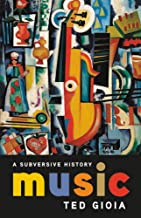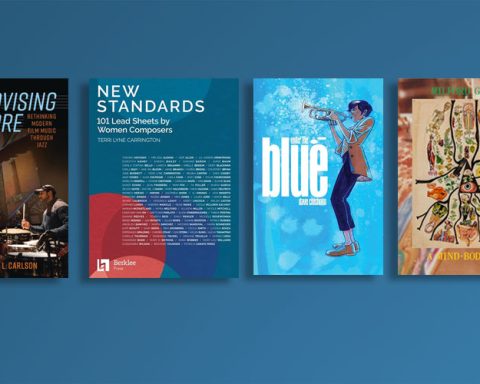Author/critic/jazz pianist Ted Gioia’s latest book. Music: A Subversive History, is a rigorously researched, close to 500-page travelogue through the history of music and its often-subversive origins. If you are a musician, love music or are a music-history buff, this is a book that should be on your bookshelf.

Gioia has written eleven non-fiction books (The History of Jazz, How to Listen to Jazz, Love Songs: The Hidden History.…) and is a graduate of Stanford and Oxford. He is a recorded jazz pianist and has established himself as a respected music historian and writer, as well a social commentator (he’s also a JJA member, honored in 2017 with the Lifetime Achievement in Jazz Journalism Award). In the 1980s Gioia helped develop Stanford’s Jazz Studies Program and served on the faculty alongside artist-in-residence saxophonist Stan Getz for several years. Between 2007-2010 he manned the successful web music portal and blog jazz.com (where I first worked for Ted as a contributor) and Gioia has been published in many of this countries most prestigious periodicals and newspapers (New York Times, Los Angeles Times, Wall Street Journal, Smithsonian, Salon, The Guardian, Los Angels Review of Books, The Atlantic Monthly etc.)
In Music:The Subversive History, Gioia describes the symbiosis between the early hunter/gatherer and later pastoral societies with the animal world. In these earliest of connections between human hunters and animal prey, there developed a ceremonial process that used music to sanctify the hunt, honor the animal victims for the sustenance they provided and, in some way, ritualized the necessary brutality of the act of the kill. Music has always been inescapably connected to violence, but it was also bound to a sacred ritual that demonstrated appreciation. It is not surprising that the earliest humans created rudimentary instruments from parts of their life-giving prey. The earliest instruments were developed from animal bones (flutes and mallets), skins (drumheads), and gut (strings), purposefully linking the tribe and its musical expression to the animals and to everyday life experiences of survival, community and ceremony.
Gioia introduces readers to a well-studied selection of characters throughout the book — from Pythagoras to Sid Vicious, from Duke Ellington to Elvis Presley, from Beethoven to Bob Dylan. In some ways these artisans affect the perception and direction of the music of their time.
He postulates that music has two genders- feminine music that concentrates on love, fertility, sex, trance, magic and unity, and masculine music that centers on discipline, order, nationalism, violence, camaraderie and maintaining power.

One of the earliest documented creators of the feminine side of music can be traced back to the ancient Greek lyrical poet Sappho (630-570 BC), from the island of Lesbos, who reportedly wrote over 10,000 lines of poetry, only a fraction of which have been recovered. Her poems, which were innovative and uniquely explored individual identity, were presumably sung while accompanied by a lyre (an early string instrument), and the themes of her poems, that have been documented, centered on family, desire, jealousy and love. These may well have been the earliest written ‘love’ songs.
By contrast, Gioia notes that the Greek poet Pindar, who resided in Thebes (518-438 BC), wrote poems from a strictly masculine point of view. Despite the popularity of Sappho’s lyrical poetry, certain factions of Greek society were more readily willing to memorialize the stoic aspects of life, warfare and strength, in their poetry and music. Pindar’s lyrical poetry, especially his Victory Odes, fit this requirement. These works were danced to and accompanied by song and lyre to memorialize valiant behavior, male athleticism, military camaraderie and victories in war. These two approaches to this early music represent the dichotomy that Gioia emphasizes. The magical connection between humanity and music through the centuries has always been deployed to promote competing philosophies to the masses.
Gioia’s musical journey is thorough and exhaustive. He touches on music in ancient Greece with Pythagoras’ mathematical approach to scientifically defining music as being pivotal. He traces music through Mesopotamia, Egypt, Confucian China and the Renaissance. He identifies organized religion’s influence on music, a role that often-thwarted bawdy, socially lower class music that was not specifically centered on praise to the deity. He discusses Gregorian chant and classically composed religious Mass music. Gioia mentions the disruptive effects of English minstrels and troubadours, the emergence of European tonal Classical music and even progressive 12-tone Classical music. In America and across the globe, the author touches on the development of multiple genres; New Orleans’s jazz, Mississippi blues, swing jazz, bebop, Motown, folk, soul, the British Rock Invasion, Punk, New Wave, glam rock, country, outlaw rock, grunge, hip-hop, electronic dance music and rap to name a few.
The book has an enormous scope spanning over four thousand years of history. Gioia’s research is impressive and backed up by his extensive employment of footnotes and meticulously sourced information. The sources include sociological and historical works that go far beyond the normal musical references. Having read several of this author’s books, I am always engaged with his research, intrigued by his contentions, amused by his humor and come away more informed.
Gioia’s work unearths the sociological concept that innovation and change in music is almost always sourced from the lower economic classes of society. He identifies the restless common and disenfranchised, the outsiders of society who repeatedly introduce new music, lyrics and ideas that push the envelope of acceptable social norms at any given stage in history. This disruptive element occurs throughout history — the minstrels, the bluesmen, the jazzers, classicists, the folk singers, the rock and rollers, the be-boppers, the punks, the avant-gardes, the rappers all have faced vigorous resistance and sometimes outright censor. Eventually, Gioia points out, no matter what is originally seen in music as outrageous, unharmonious, outside of the established rules or too disruptive to the existing order, changes are generally assimilated into the society in some measure and are morphed into a part of the new standard. In many cases the acceptance of change in music is often created by artistic innovation, spurred by discontent with social injustice (Bob Dylan), personal discontent (Kurt Cobain) or motivated by the simple desire to make oneself different (David Bowie). But as Gioia writes, these shifts in music are often diluted, commercialized and shamelessly exploited by shrewd entrepreneurs whose sole goal is to profit from the artists innovation.
Gioia doesn’t shy away from the fight between the musician and the music business, which has continued to diminish the value of the musical artist’s compensation. Sadly, modern web-based streaming of music has accelerated the dilution of the earning power of the artist. If Gioia’s history of music documents anything, it has validated the concept that music’s inherent appeal is like a powerful aphrodisiac. It attracts listeners, excites, soothes, rallies, mesmerizes, romances, enrages, nationalizes and entertains its audience. it is truly a gift. But the shameless commoditization of the music has predominantly worked against the artist and only for big businesses benefit. It is an unsustainable paradigm for the working musician/ artist and must correct.
It may require a revolution, an organized protest amongst artists, to unite all musicians to a common goal, value and equity. Cleary music offers numerous societal values far beyond purely economic factors, but if music becomes only about the money, then the real living, breathing, innovating and innovating musicians, who will not be able to sustain themselves under the current economic policies may go extinct. The prospect of the future music being manufactured by cheaper, algorithmically driven, artificial intelligence developed, Pythagorean math-generated music machines will come to pass, and music will have lost its most important element, humanity. I for one hope that I will never live to see that day.





